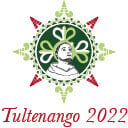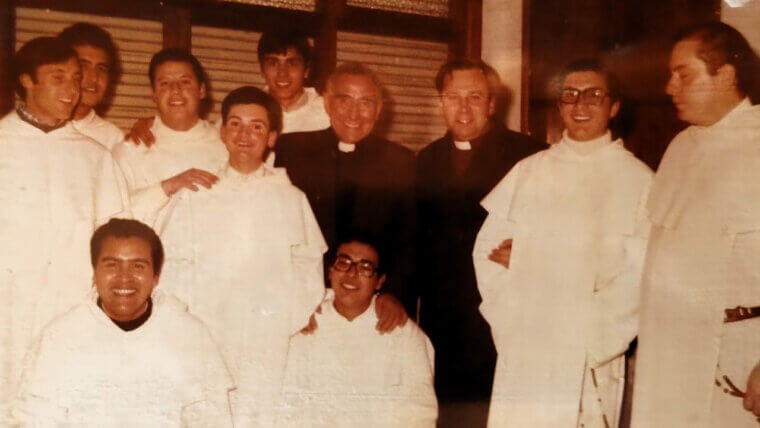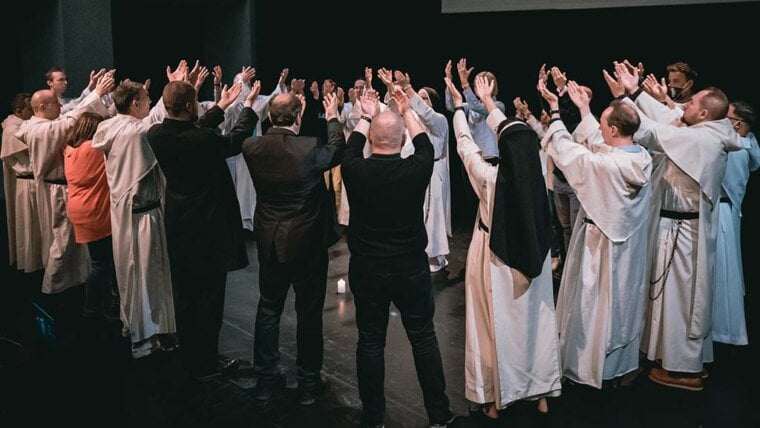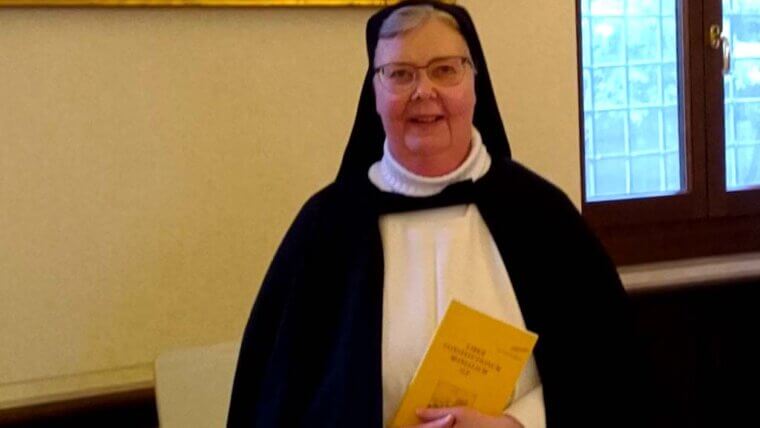A Dominican Diocesan Priest’s Reflection

I cannot hide my emotion in reflecting upon the events and revelations that led me to fall in love with St. Dominic and brought me to make profession in June 2021 in the Priestly Fraternities of St. Dominic in the Roman Province of St. Catherine of Siena. I am convinced that in each of these happenings and communications was a caress from the Lord. My journey towards the Dominican Order was unexpected and winding, so I’ll begin my story simply, by introducing myself.
My name is Alessandro Caserio, I am 39 years old and I am currently a diocesan priest serving as parish vicar in the Parish of Santa Maria Madre del Redentore in Tor Bella Monaca, Rome. Having obtained a baccalaureate in theology at the Pontifical Lateran University, I am now completing my studies in liturgy at the Pontifical University of Sant’Anselmo.
I was born and raised in Rome. From an early age, I was able to experience the beauty of faith through the family that the Lord gave me: my mother Anna, my father Carlo and my sister Pierangela. The house where I grew up was always, and still is, a place of concrete encounter with the Lord; without the example of faith and gratuitous love that my parents gave me, perhaps I would never have chosen to consecrate my life to the Lord. I also experienced the beauty of faith in the parish community of San Felice da Cantalice, which is entrusted to the Capuchin Friars Minor in the Centocelle quarter of Rome. There, I received all the sacraments of Catholic initiation, had my first experience of service as an altar boy at the age of nine, and later continued along the path of service, first as an adult minister and then, beginning in 2001, as an acolyte. My ministry as an acolyte was particularly formative because it frequently required me to visit the sick, meet the poor and tend with extreme concreteness to their spiritual and material needs. Doing so led me to discover that service to God’s people enriched my life, not only by providing me with something to do for others, but also by shaping me interiorly, by nourishing my compassion. My years in Centocelle were fundamental to my life of faith.
Even so, in subsequent years, I also pursued a life of materiality. I started working both in various shops and public offices while studying architecture at the Sapienza University of Rome, where I earned a baccalaureate in 2009. Afterwards, I worked for a prestigious American company that paid me good money and I became engaged to a girl from my home parish who shared my dreams, projects and journey of faith. It seemed that I had achieved everything: I was happy both professionally and emotionally. But the feeling wavered, and precisely during that period I perceived an ever-growing dissatisfaction. After a long period of spiritual discernment, I understood that the Lord was asking me to follow him in a different way and live a different life from the one I had planned myself; he was calling me to become a diocesan priest. Consequently, in 2012, I began the formative path towards holy orders at the Pontifical Roman Major Seminary, located at the Archbasilica of St. John Lateran, Rome, and on 12 May 2019, Pope Francis ordained me a priest at the Basilica of St. Peter in Vatican City.
While my story may seem simple, really it was not. When I decided to quit my job as an architect to pursue holy orders, I was full of doubts; I felt not only inadequate to the vocation the Lord was calling me to, but also afraid to leave everything I had built over the long years of study and work. Still, by the grace of God, I found the strength to leap into the dark, and from the first days of seminary, the dark began fading into light and I breathed with peace and serenity that I had never felt before. Day by day, I became more certain that the Lord was indeed calling me to the life of a diocesan priest. Yet, simultaneously, a restlessness was growing inside of me because I saw a great risk in the diocesan life, namely, that of not having a basic spirituality to direct, nourish and support the priestly vocation. When I shared my worries with the educators at the seminary, they explained that the charism of the diocesan priest is that of the Good Shepherd, of being open to all charisms, of being for all the faithful. This response failed to satisfy me, seeming facile and inadequate, so I decided to put into practice the words of the Gospel of Luke: “Ask and it will be given to you, seek and you will find, knock and it will be opened to you. For whoever asks gets, whoever seeks finds, and to whoever knocks it will be opened.” I began to ask the Lord in prayer to indicate to me which “spiritual garment” He thought best for me, and the answer came to me through spiritual direction. The Lord had given to me a wise and cultured spiritual father, who one day said the words I will always remember: “Read Saint Dominic and His Times, by Marie-Humbert Vicaire. It’s a demanding book, but you have three months to read it all, no more! Highlight everything that strikes you because it will be the object of our spiritual direction for some time.” To be honest, the suggestion seemed absurd to me for the reason that, until that moment, I was barely aware of the existence of St. Dominic, and, among other things, I had never expressed any interest in the Dominicans or the mendicant orders—despite being from a parish of Franciscan friars! However, out of obedience, I bought the book and started reading. Much to my surprise, a love for St. Dominic began to grow in me as I absorbed its 700 pages.
Among the first striking statements in the book was that St. Dominic “was not driven to study by pure curiosity, nor by an inordinate greed for knowledge, but by the thirst for truth.” That spoke to me as a student, and as such I was so unlike St. Dominic! My objective in reading books at seminary had always been to get good grades, not to taste the truth! It caused me great distress to recognize my wrong approach to study, but St. Dominic, through the words of Vicaire, began to relieve it by changing my relationship with study. Later, my intellectual formation was completely transfigured by reading the essay “The Wellspring of Hope: Study and the Annunciation of the Good News,” by Brother Timothy Radcliffe, OP, which revealed study as a necessity that arises from silence, of which it is like a continuation. According to Radcliffe, the truth studied and shared in charity with others is the deepest source of joy. Over time I realized that not focusing study on the apprehension of truth would have caused me to slowly wither. It would have impeded me from preparing homilies that reveal the Mystery to today’s men and women, from advising the people the Lord places along my path and from being able to listen, which is the worst impediment of all because faith is born from listening.
Another eye-opening assertion in Vicaire’s book was that St. Dominic was so “shaken by the misery of the poor and devoured by compassion that he resolved with a single gesture to obey the evangelical counsels and alleviate the misery of the dying poor in the way that was possible for him: he sold the books he owned.” This spoke to me as a former acolyte and as a pastor. It was an act of an incredible spiritual clamor because it was not only an act of great charity but also one of great renunciation: the books of St. Dominic were his material treasures. In this gesture I saw and still see the way of true poverty, the one that Jesus himself taught us, that is, to concretely empty and humble ourselves without expecting enrichment or affirmation. My Christian faith rests on this type of poverty, a poverty that is not only ethical and moral, but Christological. Poverty is the forma incarnationis with which Jesus saved us.
Yet another remarkable description in Vicaire’s book was that of St. Dominic’s apostolic life as an instrument for saving souls. Before St. Dominic accepted his mission to convert the Cathars of his time, Pope Innocent III had commissioned expeditions that later on failed. St. Dominic recognized that the failure was due to the inconsistency between the simple life the missionaries preached and the lavish one they lived. According to St. Dominic, “Not like this!” could the missionaries be credible witnesses to the Gospel they professed. This spoke to me as a pastor and evangelist. In Dominican spirituality I found the model of apostolic life so necessary in today’s consumeristic world: if I am to preach the Gospel and strive for evangelical perfection, I must follow the counsel of St. Dominic by conforming to Christ, by living the life of poverty lived by Jesus and preventing my thoughts and acts from being polluted by a worldly mentality. Only then can I become an operator of His eternal priesthood that builds the Church in the world.
Vicaire’s book is very dear to me, and so are many others I read later, such as The Dialogue of St. Catherine of Siena; Saint Dominic as Seen by His Contemporaries, by Pietro Lippini, OP; Great Joy: Dominican Spirituality as a Daily Lifestyle, by Antonietta Potente, OP; The New Wine of Spirituality, byPaul Murray, OP; and everything by Timothy Radcliffe, OP. They have caused me to love St. Dominic, drawn me to the Dominic Order such that I aspire to:
- Live in true communion, enlivened by the Word of God, with my brothers in the presbyterate and with all people the Lord puts on my path, sharing faith, friendship and life’s sad and joyful events;
- Listen incessantly to the Word of God contained in Scripture, in the parish and on life’s journey, to know God and His plan of love and salvation, and listen attentively to the people of God, to know their hopes, fears, joys and, above all, eagerness for truth;
- Study to reflect on the “multifaceted wisdom of God” and discern the “multiple ways of the Gospel in created things, in human works and institutions and in different religions” to be able to perform a true ministerial service of the Word;
- Contemplate God and His truth operating in the history of humanity, to taste the Word through silence and assimilate it in prayer and communicate to others the goodness of God, the greatness of His presence in us and the universality of His salvation;
- Celebrate the revealed Word “solemnly and in common,” especially in the daily Eucharistic celebration, because “the liturgical celebration is the center and heart of my whole life” through which I can give glory to God, invoke the Father’s mercy for all the needs of the Church and the world, strengthen my faith and discern the efficacy of the mission that the Lord asks me to fulfill; and
- Preach the name of our Lord Jesus Christ throughout the world, as the raison d’etre of my existence, proclaiming to all people the Word of God that saves and transforms humanity.
I thank God, with all my heart, that I have been able to begin my path in the Dominican Priestly Fraternities because I am convinced that it is the “spiritual and community place” that the Lord has decided to give me to guard me, form me and make me grow in holiness throughout all the years of presbyteral ministry that His infinite mercy may decide to grant me.
To the praise and glory of God!






